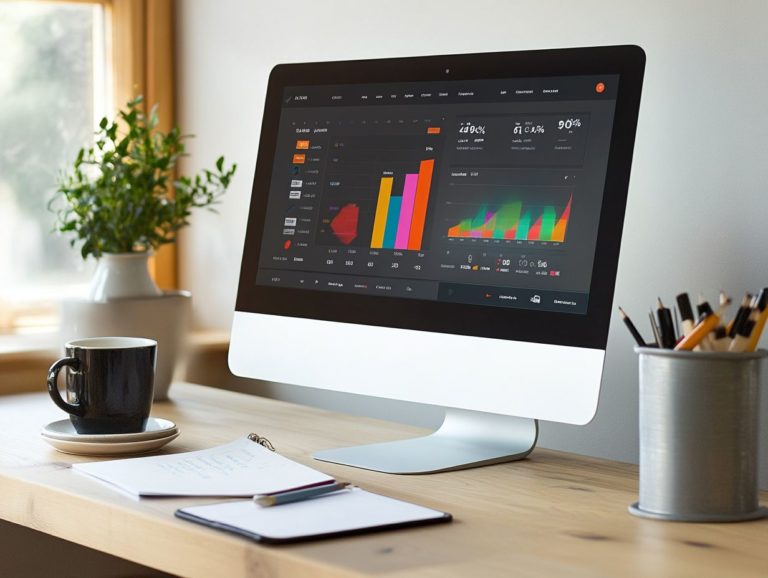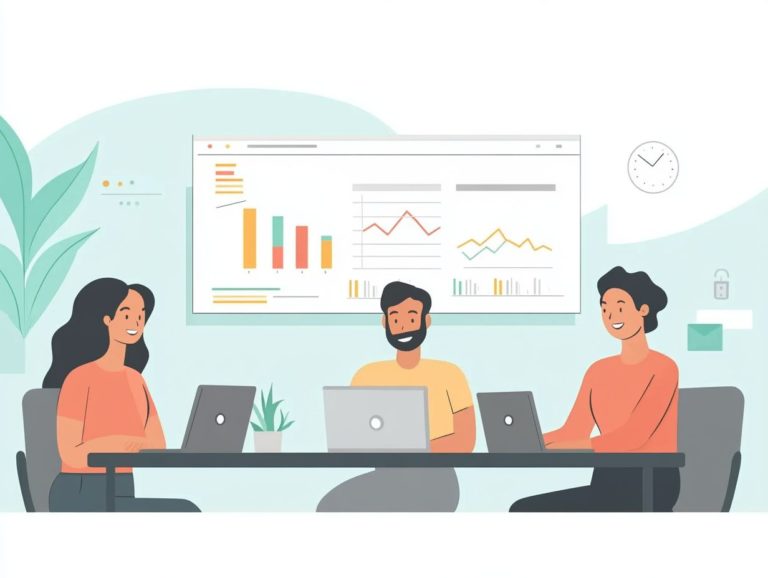38. How CRM Supports Customer Engagement in Retail
In today s fiercely competitive retail landscape, customer engagement has become paramount. Understanding how Customer Relationship Management (CRM) tools can elevate these interactions is essential for retailers aiming to enhance both loyalty and sales.
This article delves into the pivotal role of CRM in enriching customer experiences, driving sales, and building strong relationships. You ll find practical strategies for implementing CRM effectively, including the key features to seek out and best practices for collecting data and personalizing interactions.
Unlock the incredible potential of CRM today and transform your retail business into a customer-centric powerhouse.
Contents
- Key Takeaways:
- The Importance of Customer Engagement in Retail
- Benefits of Using CRM for Customer Engagement in Retail
- Implementing CRM in Retail
- Best Practices for Utilizing CRM for Customer Engagement
- Frequently Asked Questions
- 1. What is CRM and how does it relate to customer engagement in retail?
- 2. How does CRM help retail businesses in building customer engagement?
- 3. Can CRM help improve customer loyalty in the retail industry?
- 4. How does CRM support customer engagement through targeted marketing campaigns?
- 5. Can CRM help improve customer service in the retail industry?
- 6. How does CRM support omnichannel customer engagement in retail?
Key Takeaways:

CRM is essential for successful customer engagement in retail. It helps businesses understand and connect with their customers. Using CRM can lead to improved customer experiences, increased sales, and stronger brand loyalty. For insights on how CRM enhances customer loyalty in e-commerce, effective implementation and utilization can maximize its benefits for customer engagement.
The Importance of Customer Engagement in Retail
In today’s ever-evolving retail landscape, customer engagement is key to driving sales and enhancing customer experience. For businesses looking to strengthen this aspect, implementing CRM in the retail sector also helps in building strong relationships with loyal patrons.
With the rise of digital channels, understanding customer preferences is essential. This is crucial for both sales and marketing teams.
By utilizing the strength of CRM software, you can streamline customer interactions and gather invaluable feedback. For more insights on effective strategies, check out this resource on how to engage customers using CRM. Ultimately, this elevates your customer engagement strategy to align with changing expectations.
Understanding the Role of CRM
CRM software acts as a unified solution that brings together customer data from multiple communication channels. This allows you to nurture your customer relationships with precision.
By streamlining information and making it readily available to various teams, these systems foster collaboration among sales, marketing, and customer support. This interconnectedness enables you to gain deeper insights into customer interactions and preferences.
Your sales teams can tap into historical data to personalize their outreach. This significantly boosts engagement. This enhanced understanding of customer behavior allows you to refine your sales tools and develop strategies that resonate with your target audience.
Benefits of Using CRM for Customer Engagement in Retail
Leveraging CRM software for customer engagement in retail offers a multitude of advantages. You will notice an enhanced customer experience that fosters satisfaction and loyalty, especially when considering how CRM enhances loyalty programs in retail.
It also significantly improves your marketing campaigns, driving better results and deeper connections with your audience.
Improved Customer Experience
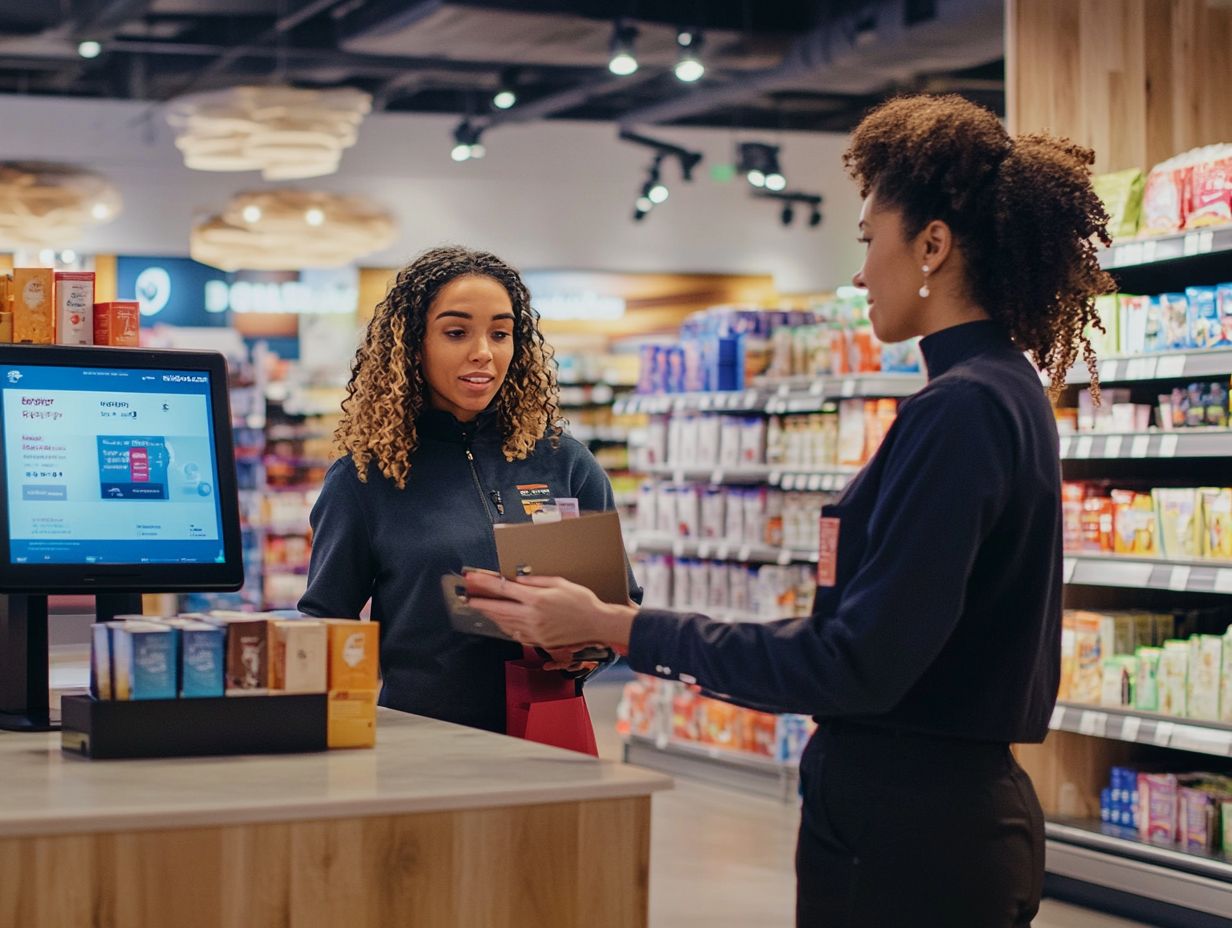
Implementing effective CRM software can elevate your customer experience by providing personalized service that aligns with their needs and preferences.
This strategic approach to CRM not only streamlines communication but also allows your business to systematically gather invaluable feedback from customers. By utilizing techniques such as automated surveys and proactive follow-ups, you gain deeper insights into customer sentiments.
Companies that actively seek feedback often enjoy a remarkable 20% increase in customer retention rates. By leveraging CRM data to analyze past interactions, you can predict customer behavior and address potential issues before they escalate.
When customers feel heard and valued, it cultivates loyalty and frequently leads to increased sales. This underscores the vital role of personalized interactions in today s competitive marketplace.
Increased Sales and Loyalty
By leveraging effective Customer Relationship Management (CRM) software, you can significantly boost your sales and cultivate customer loyalty. You do this by managing the sales cycle better and creating mutual action plans that align with your goals.
Harnessing the capabilities of these tools allows your sales team to systematically track leads, streamline processes, and gain invaluable insights into customer behavior. This not only enhances your ability to forecast sales but also fine-tunes engagement strategies to cater to individual needs.
Research indicates that businesses utilizing CRM systems experience a 29% increase in sales and a 33% rise in customer satisfaction rates. The intelligence derived from CRM data enables you to craft targeted campaigns that resonate deeply with customers, ultimately nurturing loyal relationships that drive repeat business.
Implementing CRM in Retail
Implementing CRM software in retail demands careful planning and execution to ensure that it functions as a cohesive solution. It should seamlessly integrate with your existing business processes while effectively overcoming data silos.
Key Features and Functions
Key features of CRM software that are essential for retail include customer profiles, automated workflows, accurate reporting, and tools designed to craft an effective customer engagement strategy. Additionally, understanding how CRM supports marketing in the travel industry can provide valuable insights. These functionalities not only streamline your day-to-day operations but also play a significant role in building lasting relationships with your customers.
For instance, customer profiles enable you to segment your audience based on their purchasing behavior and preferences. This allows for tailored marketing campaigns that resonate with them.
Automated workflows eliminate those tedious manual processes. This frees your team to focus on high-value tasks like personalizing customer experiences.
Accurate reporting is crucial for identifying trends and measuring the effectiveness of your campaigns. Meanwhile, engagement tools offer personalized recommendations or timely follow-up communications.
Picture a popular clothing store using CRM software to track customer purchases! They send targeted promotions based on insights from the 75 best CRM tools for customer insights in retail, leading to increased sales and enhanced customer loyalty. It’s all about creating that seamless experience that keeps customers coming back for more!
Integrating CRM into Existing Systems
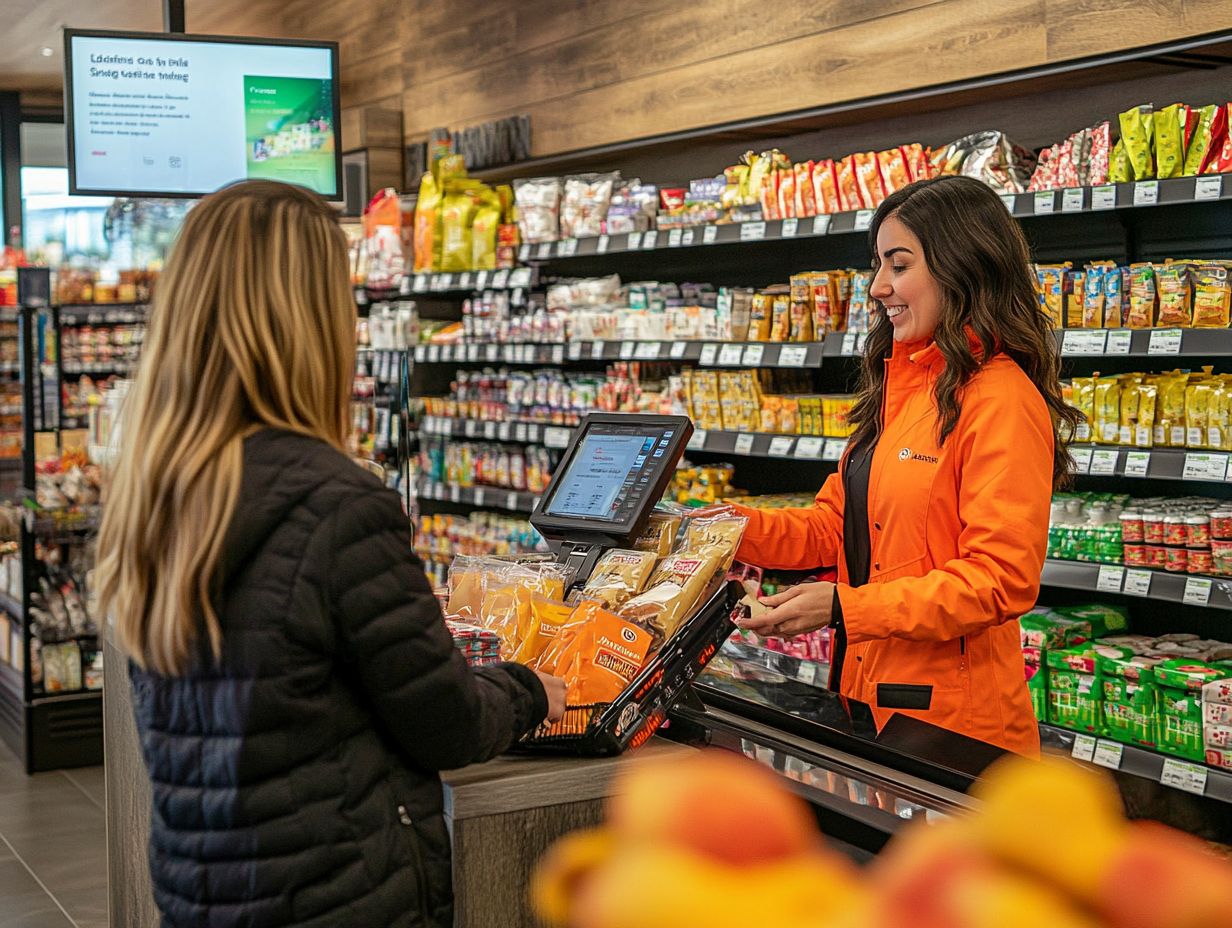
Successfully integrating CRM software into your existing systems requires a keen focus on developing a solution that fosters teamwork between departments and enhances overall business processes.
By adopting this strategy, you streamline communication between your sales, marketing, and inventory management teams, promoting a unified approach to customer engagement.
Leveraging data from various platforms allows your staff to gain valuable insights into purchasing behaviors and preferences, enabling them to personalize interactions effectively.
Implementing targeted training initiatives ensures that your employees are proficient in utilizing the CRM. This further dismantles silos within your organization.
By cultivating this cohesive environment, you can rapidly boost customer satisfaction, heighten sales efficiency, and create a more streamlined operational workflow that benefits the entire organization.
Best Practices for Utilizing CRM for Customer Engagement
To fully leverage the advantages of CRM software for enhancing customer engagement, you need to embrace best practices that prioritize understanding customer preferences.
By optimizing interactions through automated workflows, you can create a seamless experience that not only meets but exceeds customer expectations.
Collecting and Analyzing Customer Data
Collecting and analyzing customer data through CRM software is vital for crafting a robust engagement strategy that aligns seamlessly with customer needs while optimizing your sales leads.
By utilizing tools like surveys and purchase history analyses, you can unlock valuable insights into your customers’ preferences and behaviors. These methods highlight which products or services resonate most and enable you to tailor your marketing approaches with precision.
Analyzing customer feedback is a crucial step in refining your service offerings and elevating overall customer satisfaction. Engaging with customers through targeted communication can nurture loyalty, ultimately driving an increase in repeat business.
By prioritizing data-driven marketing strategies, you position yourself to adapt quickly to evolving customer expectations and market trends. This ensures your business stays ahead of the curve.
Ready to boost your sales and customer loyalty? Start exploring CRM solutions today!
Personalizing Customer Interactions
Personalizing customer interactions gives you a significant edge with CRM software. It allows you to tailor your approach to individual customer preferences, enhancing the overall experience for your customers.
By using data to understand your customers better, you can segment your audience into distinct groups based on shopping behavior, purchase history, and demographics. This targeted approach boosts your marketing effectiveness and builds a stronger emotional connection with your customers.
Create customized email campaigns recommending products related to previous purchases. This approach is likely to result in higher engagement rates.
Integrating CRM tools into customer support means that representatives can access complete customer profiles. This ensures they provide personalized assistance every time.
A prime example is a well-known retail chain that adopted this software, leading to remarkable increases in customer satisfaction and loyalty.
Frequently Asked Questions
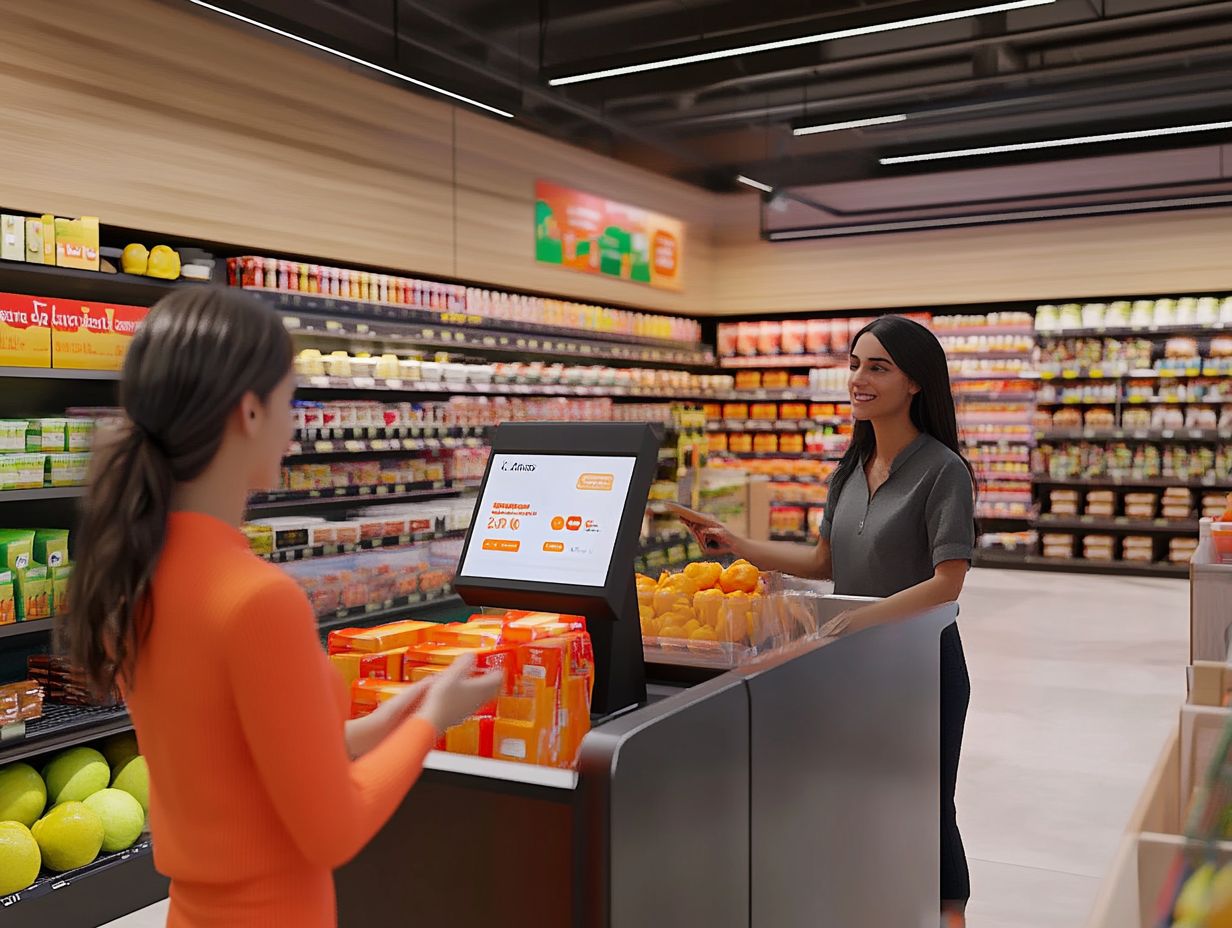
1. What is CRM and how does it relate to customer engagement in retail?
CRM stands for Customer Relationship Management. It is a system used by businesses to manage and analyze customer interactions and data throughout the customer lifecycle.
This system helps businesses understand their customers’ needs, preferences, and behaviors, allowing for more personalized and effective communication.
2. How does CRM help retail businesses in building customer engagement?
CRM offers a centralized platform for businesses to collect and store customer data. It enables tracking interactions and purchases while analyzing customer behavior and preferences.
This information helps businesses tailor their communication and marketing strategies to improve engagement and retention.
3. Can CRM help improve customer loyalty in the retail industry?
Yes, CRM plays a crucial role in enhancing customer loyalty in retail. It allows businesses to offer personalized experiences based on customer data and insights.
Moreover, CRM helps businesses identify and target their most valuable customers for special promotions and offers.
4. How does CRM support customer engagement through targeted marketing campaigns?
CRM allows businesses to segment their customer base by demographics, purchase history, and behavior. This segmentation helps create targeted marketing campaigns that resonate with customers.
As a result, it improves customer engagement and offers a higher return on investment for marketing efforts.
5. Can CRM help improve customer service in the retail industry?
CRM can significantly enhance customer service in retail. Access to customer interactions and data enables businesses to provide effective CRM implementation, resulting in personalized and efficient service.
For instance, if a customer has a specific issue, CRM helps representatives quickly access relevant information to provide a solution.
6. How does CRM support omnichannel customer engagement in retail?
With multiple communication channels, customers expect a seamless experience. CRM supports omnichannel engagement by integrating data from various touchpoints, highlighting the importance of CRM in customer service.
This integration allows businesses to create a holistic view of the customer, providing insights to deliver a seamless omnichannel experience.



